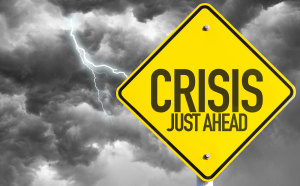Crisis planning is a key function of the executive board of any company. Knowing what to do and say in the event of a crisis situation is vital to the security of any business. And yet it is always interesting to ask the crucial question of any client – what is your crisis management strategy? And can we see a copy to ensure that we are adhering to your protocols?
Many businesses do not plan for a crisis, not because they are lazy or because ‘it will never happen to them’, but simply because they don’t think about the potential effects of situations which they see as being resolved fairly quickly. Any business offering a product or service which touches on members of the general public at any point has the potential to find itself in a crisis management situation, either something fairly minor that can be dealt with quickly, or something much more serious.
We are not necessarily talking about the likes of BP, VW or Ratners here, but a more subtle crisis situation that could damage the reputation of a business sufficiently enough to put new orders or contracts at risk. Typically, the media is after the big household names when it comes to a crisis, but the effect of a situation can have repercussions throughout the supply chain.
For example, the recent check-in delays at major airports were caused by a system called Amadeus Altea, but the coverage focused primarily on Gatwick and Heathrow airports in the UK. It was their spokespeople who were quoted in the bulk of the media coverage, although Amadeus did give its commentary on the situation. The knock-on effect of this crisis for Amadeus is likely to be serious questions asked of them at point of contract renewal for some of their major customers – 125 of the world’s leading airlines. They will want assurances that problems have been solved and that any future bad publicity or poor customer service can be avoided.
Amadeus, through its software package, is indirectly dealing with members of the general public via its customers at a time when a problem can result in seriously disgruntled people who take to social media platforms to express their dissatisfaction very quickly. This self-broadcasting of situations sparks interest in the mainstream media and within minutes of the issue being made public at the airport, news teams around the globe are reporting on the problem.
Protecting your reputation
Against this backdrop, how can a company protect itself, its brand, its staff and its reputation? Crisis management planning is still one of the most valuable days a board can spend with its communications agency. Setting out the parameters of what constitutes a crisis, how this will be handled, who will answer questions from the media and ensuring that the protocols are filtered through the entire organisation could be the difference between positive or negative media coverage.
There are some very simple techniques that can be employed to make a potential crisis seem less daunting such as applying a traffic light system to the situation. This allows senior managers to understand the severity of the crisis and act accordingly. The parameters for green, amber and red are agreed at the initial planning meeting and can be simply applied to any crisis. It’s also crucial to ensure that senior managers are trained in dealing with the media and that this training is regularly kept up-to-date. Communications agencies should be able to assist with media training senior staff.
Finally, social media is playing an increasingly important role in dealing with potential problems. Twitter, Facebook, Instagram, and even Snapchat, can be used by the public to demonstrate their displeasure with a product, service or situation. It’s therefore important that businesses understand the basic dos and don’ts of dealing with customers or handling a potential crisis through this medium. When done well, social media messages can avert a situation and create a platform for direct communication with key audiences. When done badly, social media can directly affect share prices, product sales and personal profiles of directors.
Ultimately, in an environment where everything is recorded and reported for all to see, businesses have to be prepared for the worst and hope for the best. After all, as the cliché goes, failing to plan is planning to fail.
If you are interested in putting together a crisis management plan, reviewing an existing protocol or want media training for your senior board, please contact us at [email protected] or give us a call on +44 1477 539539.
By Claire James, Account Director at The Scott Partnership.





